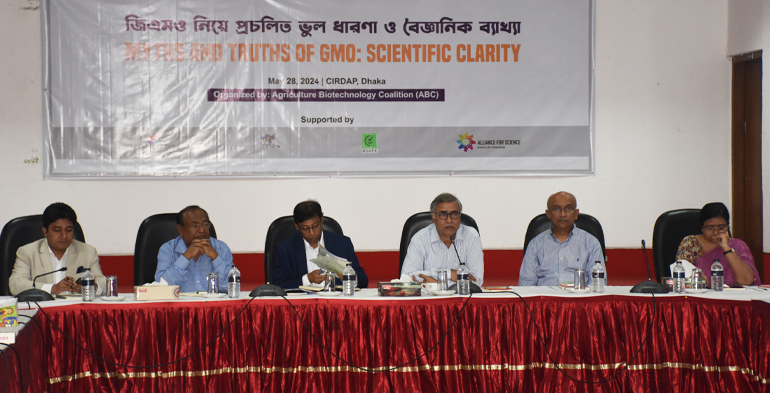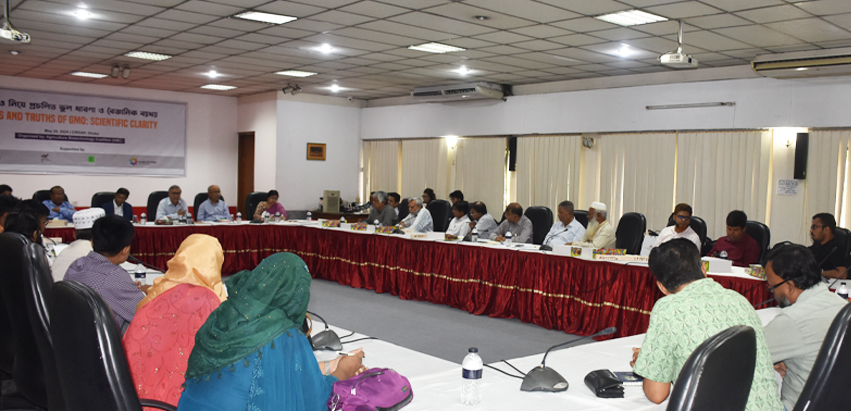
Agrilife24.com:To expliticize the Myths and Truths of genetically modified organism (GMO) on recent controversy of Golden Rice and Bt. Brinjal a dialogue program has been jointly conducted by Agriculture Biotechnology Coalition (ABC), Global South Hub-Asia, Farming Future Bangladesh, Alliance for Science and Bangladesh Academy of Sciences on May 28,2024 at CIRDAP Auditorium, Dhaka.
Recently, the debate surrounding genetically modified organisms (GMOs) has become clouded by misinformation. Amidst this critical situation, it is essential to engage in constructive dialogue that is grounded in facts and supported by reliable sources. The event title "Myths and Truths of GMO: Scientific Clarity" emerges as a response to the growing misinformation campaigns and public scepticisms surrounding GMOs, specifically focusing on two emblematic examples: Golden Rice and Bt Brinjal.
Addressing the misinformation and controversy the scientists, academia and the researchers involved in an open dialogue to give response to the anti-GMO forum. Mr Anwar Faruque, Former Secretary, Ministry of Agriculture & Convener, Agriculture Biotechnology Coalition (ABC) remarked “Controversy related to GMO technology is not a new thing but any misinformation can be doubled if these are fuelled by propaganda. Anti-GMO organizations are playing the role of propagandist who doesn’t have any through background study on GMO. So, we are here to navigate the ethical, social, and environmental implications of this technology”.
On that context Arif Hossain, CEO and ED, Farming Future Bangladesh said, “Crops created by GMO technology are often subjected to various criticisms and misinterpretations. Genetically engineered crops provide various benefits ranging from providing increased nutrients to defending harmful pests without using pesticides and above all guaranteeing high yields on limited land. Therefore, for sustainable development and to build secure future, all false ideas should be put to an end and a clear idea of science-based solutions should be presented”
''GMO technology is a powerful tool that can be used to ensure our food security and nutrition. However, it's important to be aware of the potential risks and benefits of this technology and take steps to address any concerns. Through open and honest discussion, we can explore the potential human health and environmental impacts of GMOs. This will allow us to use this technology responsibly and ensure it benefits everyone," said by Dr. Aparna Islam, Professor, BRAC University.

Talking about Philippine court decision that has ceased the commercial propagation of Golden Rice and Bt Brinjal and the repercussion of Bangladeshi anti-GMO associations ; Dr. Abdul Kader, Principal Scientific Officer, Bangladesh Rice Research Institute (BRRI) noted that, “It’s very unfortunate that some people are making derogatory comments on GMO and hindering the path to scientific advancement.
According to World health Organization (WHO), one in every five pre-school children in Bangladesh is vitamin A-deficient and most of them belong from impoverished communities where they can barely afford Vitamin-A fortified vegetables in that high-priced market in their daily meal. So, in that case a significant portion of their vitamin A requirements can be fulfilled through golden rice. Therefore, I strongly oppose the ongoing propaganda by anti-GMO activists to ban commercial propagation of Golden Rice and Bt Brinjal.”
Dr. Mohammad Shahjahan Kabir, Director General, Bangladesh Rice Research Institute said that, “Scientists from BRRI speaks on the basis of research evidence and fact-based information, they don’t make any opinion based on emotion. Scientists have conducted various experiments on this rice for many years and have confirmed that it is completely safe for the human body, animals and the environment. The US Federal Drug Administration (FDA) has tested this rice and said it is completely safe. The same has been said by organizations such as Health Canada and Food Standards Australia-New Zealand. No study or journal in the world has proven the environmental, health and other risks of GM crops.

During the dialogue, Dr. Md. Abdullah Yousuf Akhond, Director of Research at the Bangladesh Agricultural Research Institute (BARI), emphasized that the unknown often leads to fear-mongering, including with GMOs. However, in Bangladesh, we strictly comply with all local and international regulations regarding GMOs. He pointed out that we spend a staggering $5 billion annually importing chemical pesticides, which leave harmful residues on our crops. As a safer alternative,
Dr. Akhond proposes the use of GM pest-resistant crops. He further clarified that the four varieties of Bt brinjal that were commercially released underwent rigorous testing trials and met all the regulatory requirements of our national biosafety frameworks. Therefore, any concerns regarding the safety of Bt brinjal are unfounded.
An interactive question answer session was also conducted where there was active participation of the participants. The insightful discussion gathered during the dialogue program will surely contribute to a more nuanced understanding of GMO, foster awareness, educate people about the evidence-based research and most importantly clarify misinformation to empower individuals so that they can make well-informed decisions about their food choices and consider sustainable agricultural practice.
























